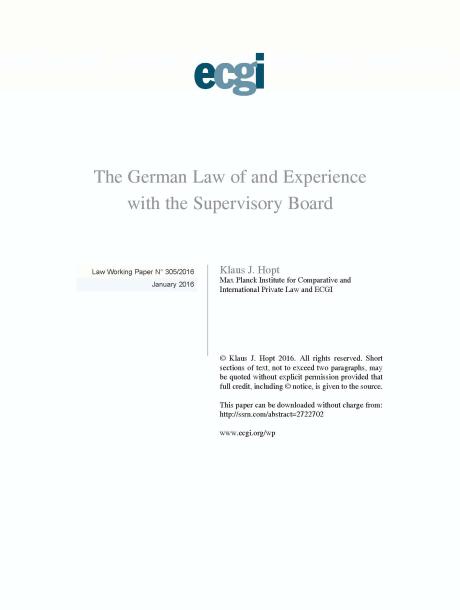
The German Law of and Experience with the Supervisory Board
Abstract
Together with a number of other countries including China Germany has a two-tier board system, i.e. its stock corporation law provides for the division between the management board and the supervisory board. This is different from most other countries, for example the USA, the United Kingdom, Switzerland and others. Both board systems have their assets, yet in principle both fulfill adequately the task of control over management; there is no clear superiority of one of the two of them. The national board systems are highly path-dependent. Germany has had the supervisory board ever since the late 19th century when the state gave up its concession system, i.e. the approval and supervision of corporations by the state, and introduced a mandatory supervisory board to take over this task from the state. Germany strictly refuses to give shareholders the option to choose between the two systems. Labor codetermination in the supervisory board may be one of the reasons for this refusal. While European legislators have been rather prudent in regulating board matters, there has been a considerable de facto convergence between the two systems. Yet path-dependent divergences remain, as to Germany this is true particularly in respect of quasi-parity and full parity labor codetermination in the board of corporations, but also as regards stakeholder orientation and a codified law of groups of companies featuring corresponding board duties for both parent and subsidiary companies. The German Stock Corporation Act and the German Corporate Governance Code contain extensive provisions on both the management board and the supervisory board. The provisions on the supervisory board have been considerably reformed since the late 1990s. Today, German corporate governance under the two-tier board system is more or less in line with international good corporate governance. In Germany there are considerable controversies concerning (i) the diversity requirements of 2015, (ii) the definition of independence for supervisory board candidates, (iii) the pros and cons of mandatory quasi-parity and full-parity labor codetermination and (iv) the role of the nonbinding German Corporate Governance Code. The article pursues two goals: It informs a non-German audience on the regulation of the supervisory board in Germany, both by law and code, highlighting major current problems and controversies, and it undertakes a functional assessment of the experience with and
the functioning of the supervisory board in a comparative perspective.







